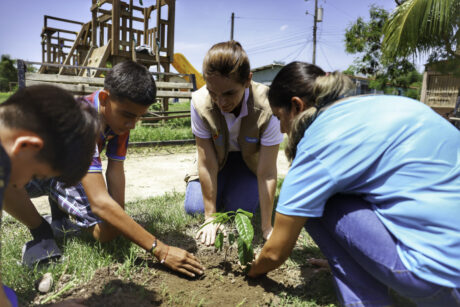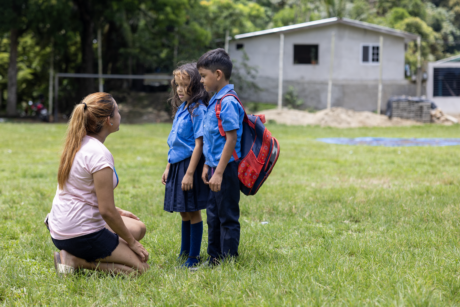Para abordar a complexa dinâmica de violência e migração que as comunidades enfrentam, the USAID Sembrando Esperanza viewed these challenges through a human security lens that worked to build collective efficacy, reforçar a coesão social e criar um sentimento de enraizamento 25 municípios.
Sembrando Esperanza’s human security approach transcended the narrow path of traditional development to address key drivers of violence and irregular migration. Working within three programmatic pillars — economic security and equality, combatting violence and addressing gender- and family-based violence — Sembrando Esperanza placed families, communities and their organizations at the center of its efforts. They were partners in the co-creation of activities, management and oversight of the activity and owners of their decisions and trained to carry on after Sembrando Esperanza’s intervention.
The USAID-funded program led a consortium of two local organizations and Creative Associates International to form part of the management structure and program implementation team: Comissão Menonita de Ação Social (CASM) e Fundação Nacional para o Desenvolvimento de Honduras (FUNADEH). Junto, they worked with the private sector, civil society and academic institutions to identify the challenges and co-create solutions.
Sembrando Esperanza relied on data from systems mapping, perception surveys, intersectional analysis and political-economic analysis at national and municipal levels. As part of the program’s collaborative learning approach, results were widely disseminated among other implementers and local organizations to help refine the activities in each community and municipality.
Conquistas do Programa
Collective efficacy is a community’s ability to work together to promote the common good, including collaboration among neighbors to volunteer to address local challenges such as security, violence prevention and irregular migration. Sembrando Esperanza’s interventions emphasized local actors’ ability to mitigate challenges by building their skills, providing resources and integrating with others with aligned interests that build trust and benefit communities. They responded to hotspot-specific expressions of violence, root causes of migration and violence; focused on individual and collective behavioral change for primary-prevention; and linked trust with action for the common good.
Research has confirmed the relationship between violent activities and propensity to migrate and exposure to traumatic events, aggression, intra-family migration and substance abuse. Sembrando Esperanza connected high-risk youth with interventions that include community violence prevention, irregular migration reduction prevention and expanded service referrals.
An effective migration and violence prevention strategy is multifaceted and requires a variety of interventions. Working with local and national boards, Sembrando Esperanza ensured that local violence and migration prevention strategies, lessons learned and best practices are documented across hotspots and shared so a feedback loop between practice and policy is established.



